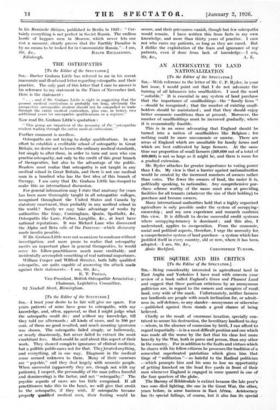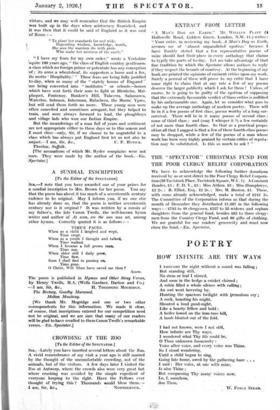THE SQUIRE AND HIS CRITICS
[To the Editor of the SPECTATOR.] SIR,—Being considerably interested in agricultural land in East Anglia and Yorkshire I have read with concern your ; review of a book called England's Green and Pleasant Land and suggest that these partisan criticisms by an anonymous politician are, in regard to the owners and occupiers of rural ; land, very wide of the mark. Unfortunately, neither farmers nor landlords are people with much inclination for, or adroit- ness in, self-defence, so any slander—anonymous or otherwise —published against them stands a good chance of being believed.
Chiefly as the result of -enormous- taxation, specially con- trived to secure his destruction, the hereditary landlord to-day —whom, in the absence of connexion by birth. I can afford to regard impartially—is in a most difficult position and one which was made all the worse by the fact that his class lost more heavily by the War, both in purse and person, than any other in the country. For in addition to the faults and virtues which he shares with his fellow-citizens he possesses the tradition of a somewhat superheated patriotism which gives him that - tinge of "militarism "—so hateful to the Radical politician --which prompts him and his sons to lose no opportunity of getting knocked on the head five yards in front of their men whenever England is engaged in some quarrel in one of the four quarters of the globe.
The Barony of Ribblesdale is extinct because the late peer's two sons died fighting, the one in the Great War, the other, years before, in some business in East Africa. Aristocracy has its special failings, of course, but it also has its special 'virtues, and we may well remember that the British Empire was built up in the days when aristocracy flourished, and it was then that it could be said of England as it was said of Rome :—
" To plant her standards far and wide, Expending wisdom' knowledge, worth,
She sees the warriors die with pride Who make her mistress of the earth." •
"I have my fears for my own order," wrote a Yorkshire squire 100 years ago, "the class of English country gentlemen, ia class which no foreign prince or potentate has any conception
; its arms a wheatsheaf, its supporters a horse and a fox, its motto Hospitality.'" These fears are being fully justified to-day, when so many of the "stately homes of England" are being converted into " institutes " or schools—homes !which have sent forth their sons to fight at Blenheim, Mal- plaquet, Fontenoy, Bunker's Hill, Talavera, Salamanca, Waterloo, Sobraon, Inkerman, Balaclava, the Marne, Ypres, but will send them forth no more. These young men were often conceited and sometimes arrogant, but they helped to train, and were always forward to lead, the ploughboys and village lads who won our Indian Empire.
But the meanderings of a man full of years and sentiment are not appropriate either to these days or to this season and must close—only, Sir, if we choose to be ungrateful to a class which has always put England first let us not also be [The accusations of which Mr. Ryder complains were not ours. They were made by the author of the book.—ED. tSpectator.]











































 Previous page
Previous page